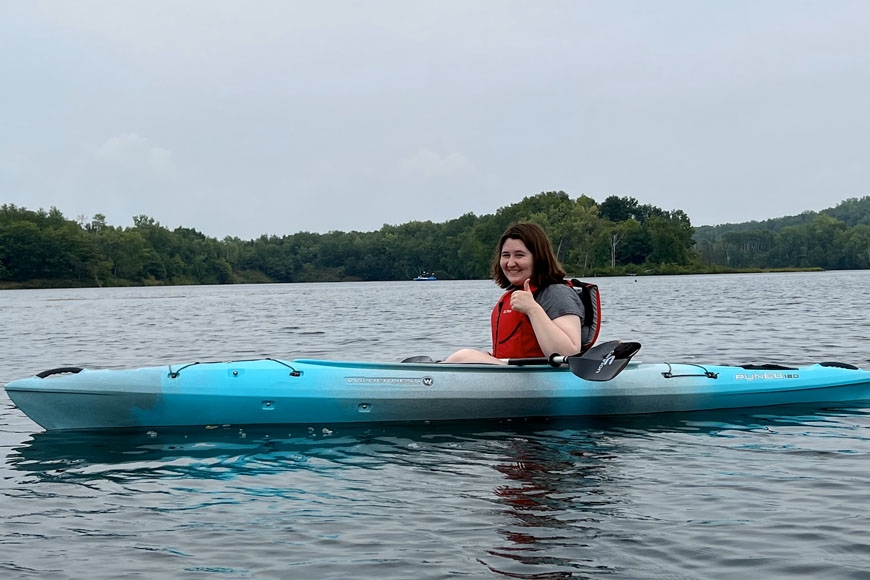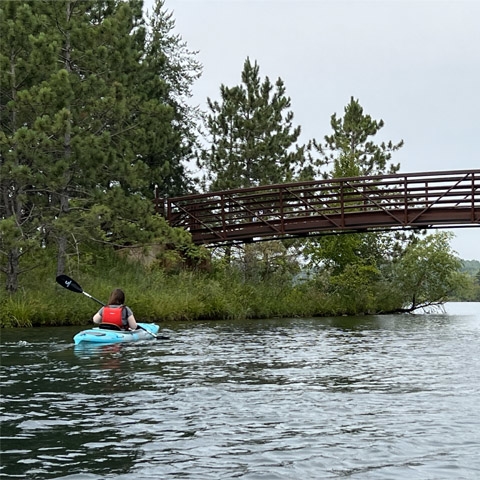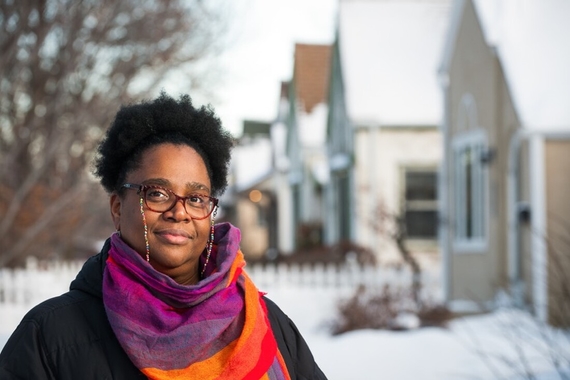Taking the Lede: Report For Minnesota Program Provides Experiential Learning
There’s no experience like hands-on experience. The Report For Minnesota program provides exactly that for students at the Hubbard School, connecting students with summer reporting internships. Students hone their skills and spread their wings at local newspapers in Greater Minnesota. For Hannah Ward, who had not previously had time to pursue a reporting internship and had never spent months far from home, it was an eye-opening and informative experience.
Dispatched to Brainerd
Ward learned about the program in her Intermediate News Reporting class and was immediately intrigued. She appreciated that the program is “an immersive experience, and you don’t have to deal with managing schoolwork at the same time.” In the summer of 2023, she was assigned to the Brainerd Dispatch, which provided her with a change of scenery. “I had been to Duluth maybe three times in my life,” she says. “And otherwise, I haven’t really gone north of the metro.”
The summer-long internship was Ward’s first time living “more than 15 minutes away from my mom.” She says, “it was kind of rough when I was first there alone.” The staff at the Dispatch helped her, though, by welcoming her into their close-knit workplace. "There was one day I locked my keys in my car. I didn't realize until I was in the office," she says. Fortunately, "one of the guys had a [tool] to help me. They saved the day."
Ward’s managing editor, Renee Richardson, took Ward under her wing. “She took me out kayaking on some of the lakes in Cuyuna because she’s a big kayaker,” Ward says. “She was great at making sure that I saw more of Brainerd than just what I did for work.” This year, the program has started providing modest honorariums to community mentors at each paper to help students connect with their communities.
The Hubbard School provides the program’s financial support, which has increasingly drawn generous contributions from donors. This year, students have been placed in Brainard and at newspapers in Willmar and Mankato with funding that covers 40 hours of full-time minimum wage work for 10 weeks and a $2,500 living stipend.
“The program began with our commitment financially to support these students,” says Senior Lecturer Gayle Golden, a Charnley Professor and Morse-Alumni Distinguished University Teacher at the Hubbard School who oversees the program. “And it has continued to grow with the excitement and the generosity of the donors.”
Learning On the Job
As the Dispatch staff helped Ward settle in, they wasted no time throwing her into the deep end of reporting. Richardson encouraged Ward to find her own stories, teaching her that “there are stories everywhere. When I had to go the county fair, she said, ‘Just walk around and you’ll find something.’”
Ward worked with some Dispatch reporters, including city government reporter Theresa Bourke, who brought Ward to a couple of City Council meetings. “It was helpful to see the note-taking process,” says Ward, who learned a lot from how Bourke would begin writing stories while the meeting was still ongoing. She later worked with public safety reporter Tim Speier, attending a court case and learning note-taking techniques in settings where recordings are not allowed.
“The staff is very small,” Ward explains, which allowed her to write a “big variety” of stories. “That was invaluable, just to have the chance to cover so many different topics.” Her articles covered business, events, public safety, and more. “One time I woke up at 5 AM and drove up for 50 minutes to go to a community center that was holding a program for kids where they could go out on the lake and look for loon nests with biologists,” she recalls. “It was really cute.”
Ward explored multimedia storytelling as well, with her editors encouraging her to use “pictures and videos with stories wherever I can.” She felt well-prepared for the writing and editing processes thanks to her classroom experiences and enjoyed getting to produce her first published pieces. She also developed the soft skills critical to a reporter’s trade, such as interviewing story subjects. “It’s good to know for wherever I wind up,” Ward says, “I have a variety of skills.”
A New Point of View
Along with developing Ward’s suite of journalism skills, the internship granted her a firsthand look at the work that goes into producing newspapers. “It made me think more about it and made the whole process of storytelling seem more human because you see the humans finding the stories and writing them,” she says. “It’s easy to call everything, like, ‘The Media’ or ‘The News.’ And when you see the people, it’s more, ‘That’s Bob’s story.’ It all seems more grounded.”
With this newfound appreciation for newsroom work came some more melancholy takeaways. “It makes me sad that newspapers are not going to be around forever. It was fun to see my name in print and save all the newspapers.” Working in Brainerd helped Ward see how important local news is for smaller communities. “It made me better understand how important it is to fund local news.” With fewer news outlets available, “there are fewer reporters to go out and tell stories that need telling.”
Golden explains that the threats faced by rural newspapers were a source of inspiration for this program. “Newspapers in rural areas across the country, including Minnesota, suffer from dwindling resources,” she says. “It has turned out to be a real win-win for both the students and the local papers.”
Another major takeaway for Ward? “It made me realize that it's an industry that I do want to go into, having done the dirty work part of it,” she says. “Going out in the boiling sun, getting bitten by mosquitoes and waking up at 5 AM and staying until midnight, locking my keys in my car… Even the bad parts of the job are something I can deal with and be fine.”
“I’m very glad I got to go to Brainerd,” Ward shares, “and [for] all the people I met; we’re still Facebook friends.” She even visited Brainerd and reunited with the staff last month while picking up a plaque—one of her Dispatch stories won Best Business Profile at the Minnesota Newspaper Association awards.
“Brainerd is a special, special piece of my heart now.”
What makes Report for Minnesota possible?
The Hubbard School provides funding for students like Hannah to participate in the program because small newspapers are not often in a position to fund internships themselves.
The Hubbard School launched this program thanks to support from donors in honor of the School's 100th anniversary, and it maintains the program thanks to continued support.
This story was written by Max Pritchard, an undergraduate student in CLA.




